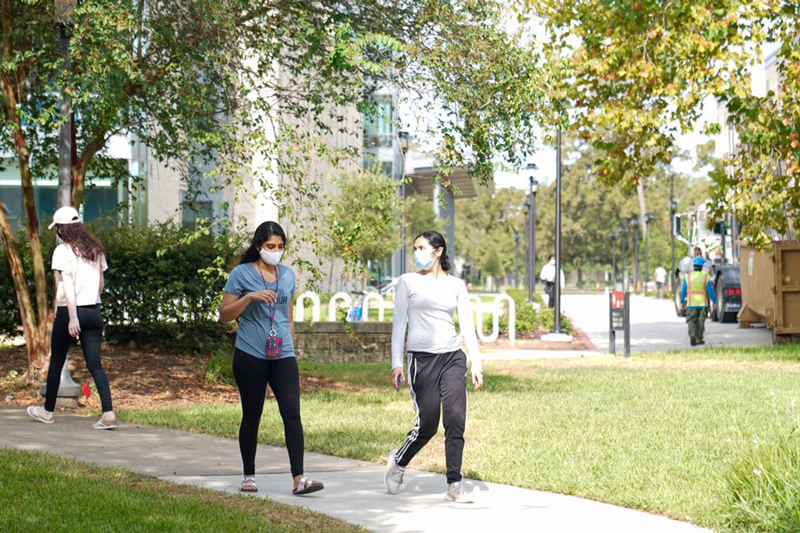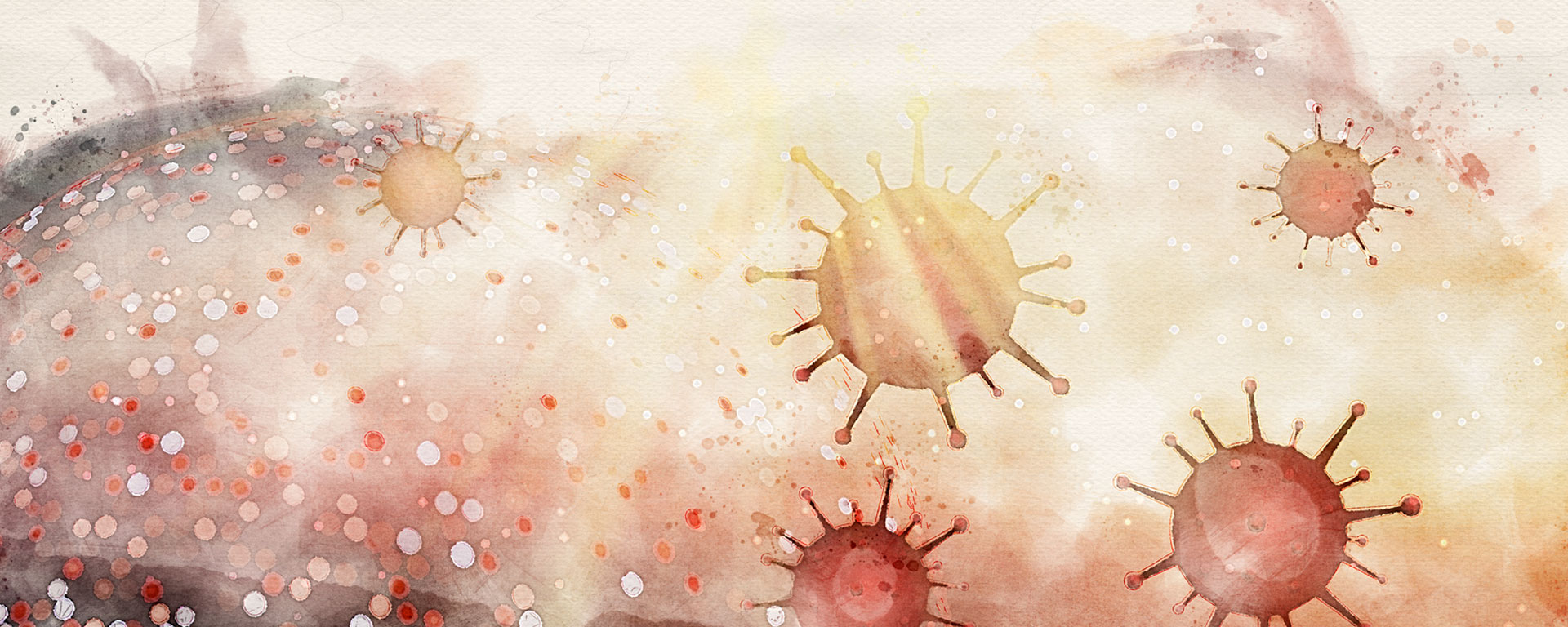
Everyone across the University of Houston had to move fast.
COVID-19 had come to Houston, and the city was headed towards a series of restrictions for in-person services and a move to virtual operations. But how does a university — much less one of its divisions that offers dozens of vital student support services — shift from operating face-to-face to remotely?
As it turns out: fast, effectively and creatively.
The 30 departments that make up the Division of Student Affairs and Enrollment Services quickly used a variety of online platforms, new technology, quick thinking, and some creative ingenuity to provide services, programming and events virtually to keep students entertained, engaged and healthy.
Supporting students to help them succeed is — and will always be — our top priority, said Dr. Richard Walker, vice president for student affairs and enrollment services.
”I knew our talented and thoughtful staff would develop effective and meaningful engagement opportunities to meet our students where they were due to the pandemic,” Walker said.
Some programs and services were constrained with strict restrictions of no public contact. Campus Recreation was required to stop all in-person services, for instance, and Cougar Cupboard, unfortunately, could not continue to provide direct support to students. Many departments shifted quickly to remote services, with most employees — including student workers — working remotely to stay safe during the early stages of the pandemic.
REMOTE SUPPORT
Departments shifted existing services online and also created new programming to help support students, faculty and staff who might find themselves struggling with anxiety or other mental health concerns related to the pandemic.
Counseling and Psychological Services, for instance, quickly embraced an online environment and placed a special emphasis on reaching students, staff and faculty through virtual outreach programs. They launched the Coogs Conquer COVID workshop series, and as the months have passed, they’ve transformed it into the Coogs Conquer mental health series for continued support and beyond.
Both CAPS and the Student Health Center’s Psychiatry Department began offering their services via virtual sessions, and the telepsychiatry option became so popular that it will remain even once life on campus returns to normal.
Unable to hold in-person career fairs, University Career Services took advantage of the Microsoft Teams software made available by the university and created an all-new way to connect employers with students — virtually. They were so successful at holding virtual career fairs that they have even taught other universities and colleges how to do it.
The first-ever University of Houston Virtual Recruiting Event through MS TEAMS was held on May 27, 2020, with 27 companies and 144 students logging in to connect. They’ve also been seeking out new ways to not only improve what they’re doing virtually, but to decide what new ways they can serve students who are about to embark on job searches.
The UCS team analyzes their weekly engagement data to find trends, they survey students and employees, advise students concerned about the pandemic’s impact on the job market, and collaborate across campus to support students and alumni engaged in job searches. These collaborations include Campus Jobs for Coogs, Town Hall Career Development for International Students, alumni mock interviews, and livestreaming on Instagram for career advice and prep sessions.
VIRTUAL ENGAGEMENT
Campus Recreation may have been closed for in-person activities, but that did not mean students couldn’t still work out. When its facilities closed in March, Campus Rec took much of its programming online: It began offering on-demand fitness, live streamed group fitness classes on social media, offered socially distanced fitness challenges, and even an eSports competition. In addition, when it came time to reopen the facility, Campus Rec spent weeks adapting policies, training workers, and reengineering the space so students could work out safely.
The LGBTQ Resource Center created a Discord server to serve as a safe space for students to interact with each other and get support from staff, and its various channels are used frequently by students every day.
The Center for Student Involvement worked diligently to ensure that students continue to have a positive experience in co-curricular learning. This included hosting many events virtually via Zoom, passive programs, and developing a significant number of web-based resources. By visiting the CSI On Demand website, students can still find a number of activities, training, and online engagement to best support their experience in leadership, civic engagement, programming, and management of their student organizations.
Transition to remote work for the Center for Student Media included publishing the last two editions of the Cougar and sharing them on CoogNews. It also provided an opportunity for Coog Radio and CoogTV to showcase their reach to the students, faculty, and staff off-campus. Coog Radio provided playlists to help the day move along faster, while CoogTV kept their on-demand movies updated throughout the summer.
After the Center for Fraternity and Sorority Life moved all of its staff to remote work, it also shifted all of its advising operations to virtual platforms, including governing council advising and chapter coaching. CFSL transitioned its FSL 101 program online, and also facilitated its Fraternity/Sorority Presidents’ Leadership Summit in a virtual format.
CFSL transitioned member education to a virtual format as well, and multiple chapters held their first-ever virtual initiations and/or new member presentations.
It wasn’t long before the University realized summer classes would need to be all online, so the division evaluated their shift of services during the spring semester and made additional improvements for the summer months including, but not limited to, online through innovative new chat programs, video meetings, and live streaming on social media.
The University’s Enrollment Services team used collaboration, strong leadership and creative problem-solving to pivot to remote services, including the creation of an online orientation that saw more than 10,000 students completing it virtually.
In preparing for The Fall 2020 semester, a complete reengineering of UH’s class schedule to offer HyFlex, Asynchronous and Synchronous options became a top priority over the summer. To remain in compliance with the public health guidelines, courses needed to be officer in a safe, socially distanced environment or virtually. The Division is very proud of the multiple roles our staff from Enrollment Services took on to support these efforts.
SLOW RETURN TO CAMPUS
Every department within the Division of Student Affairs and Enrollment Services made plans to reopen for in-person services for the fall 2020 semester, although many operate at reduced staffing to ensure that employees remain safe. Virtual services will also continue to be standard until life on campus returns to normal.
But many departments focused on keeping some UH traditions alive, despite the pandemic.
For instance, UH Weeks of Welcome, one of the university’s longest-standing traditions, welcomed thousands of new and returning students in an entirely new way. For the first time ever due to COVID-19, UH Weeks of Welcome was almost entirely virtual. From digital scavenger hunts like Exploring the Powerhouse to talent shows like Coogs Got Talent to virtual student organization fairs and Greek-A-Palooza, students were able to learn about UH, campus resources, and a myriad of ways to Get Involved in a fun, highly engaging manner.
Weeks of Welcome kicked off with a socially distant screening of the blockbuster film Birds of Prey. From there, UH’s top student DJs battled for the honor of opening for EDM sensation Krewella in a UH-exclusive virtual concert. Students ‘laughed their masks off’ with hilarious performances from SNL comedians Melissa Villasenor and Chris Redd. UH Weeks of Welcome was capped off with an amazing performance from hip-hop artist Rico Nasty.
“Our staff has learned a great deal about themselves over the last couple of months, said Dr. Daniel Maxwell, associate vice president for student affairs. “In addition, they have found new and innovative ways to meet our students where they were during this pandemic. I am not sure what the ‘new normal’ maybe when this pandemic concludes, but I am confident that we will continue to support student success in ways that positively impact our students’ experience at the University of Houston.”

